Nutrition Science & Dietetics News
Preventing Childhood Obesity
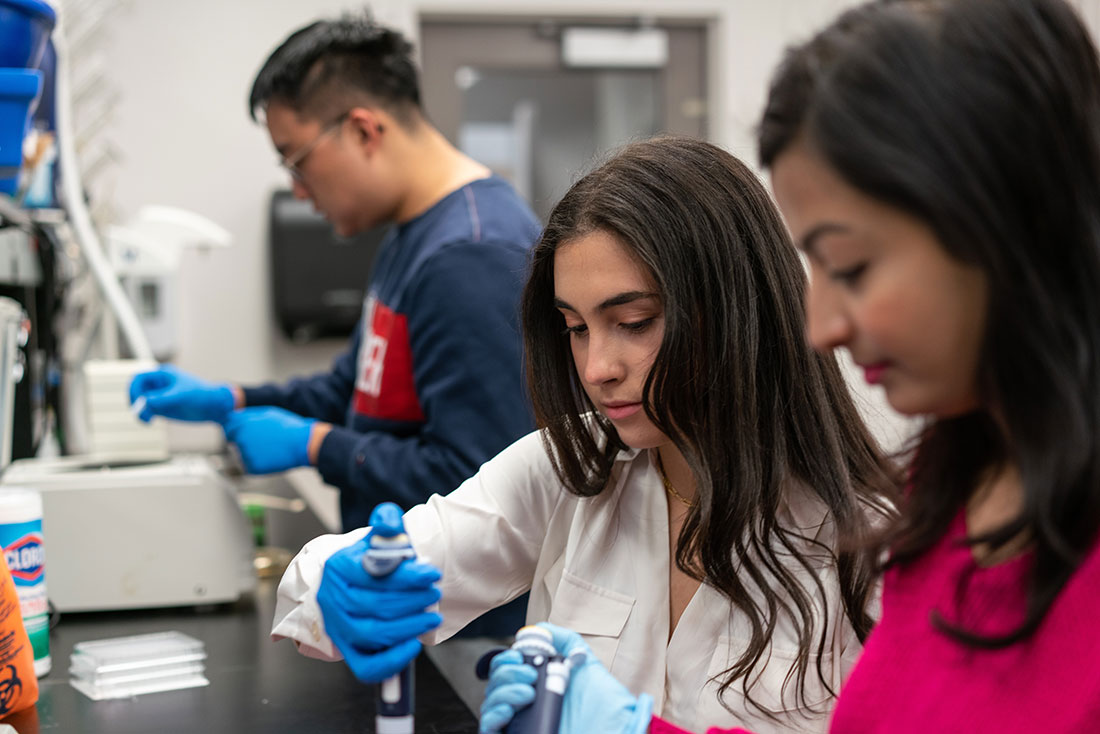
Childhood obesity is a serious problem in the United States, where 1 in 5 children and adolescents are affected, according to the Centers for Disease Control and Prevention.
While obesity in mothers has been the primary focus of early life nutrition and children’s health, obesity in fathers has been overlooked. According to the CDC, about 2 in 3 males of reproductive age in the United States are either overweight or suffer from obesity.
Latha Ramalingam, Ph.D., an assistant professor of Nutrition and Food Studies in the Falk College, has spent the last two years working with students on research involving parental obesity and how a diet modification–specifically the consumption of fish oil–can potentially reduce a father’s or mother’s obesity and its adverse effect on children.
After studying effects of fish oil in maternal obesity last year, Ramalingam and Nutrition Science students Junhui “Carol” Yang ’23 and Mariana Pérez Lugo ’24 are currently examining obesity in male mice to explore the idea that a healthier father will produce a healthier child.
“If (human) fathers are obese, it increases the risk of obesity by 10 to12 times in their children,” Ramalingam says. “My research will hopefully establish that fathers need to pay attention to what they eat during the pre-pregnancy period to help reduce obesity in their children.”
Yang, a double major in Nutrition Science at Falk and Psychology in the College of Arts and Sciences, is investigating the role of fish oil in reducing non-alcoholic fatty liver disease and obesity in males, and examining if healthier fathers are producing healthier female offspring.
Pérez Lugo is studying the role of fish oil in reducing obesity in male offspring by analyzing the adipose tissue (i.e., body fat) of obese male mice who are fed fish oil and their offspring.
The American Heart Association is funding this year’s research and funded last year’s research, which was spearheaded by Akriti Shrestha G’22, a research assistant in the Nutrition Science department. Last year, Shrestha focused on the male offspring liver tissue.
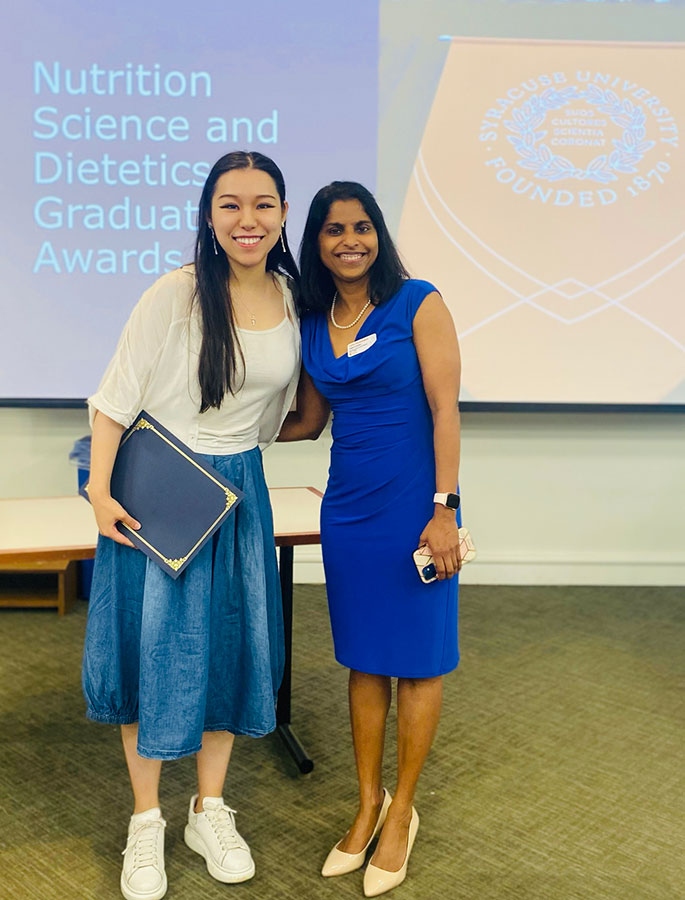
In a previous study, Ramalingam had examined the benefits of fish oil for pregnant female mice and their offspring. Shrestha’s research and the ongoing research with Yang and Pérez Lugo is connected to Ramalingam’s earlier study, with the ultimate goal to determine if fish oil consumption in both females and males will lead to healthier offspring. Ramalingam’s ongoing research was recently highlighted in this story from Syracuse Woman Magazine.
“The rates of obesity are increasing and leads to other diseases, including diabetes and heart diseases,” Ramalingam says. “I have a genetic risk of heart disease and hence my interest in reducing obesity and associated heart diseases. What better way than to reduce it using diet or bio actives.”
Ramalingam says this study is important for Yang and Pérez Lugo, who are both interested in attending medical school. The research training in nutrition will help them recognize the importance of nutrition in the prevention of chronic diseases.
To get a better understanding of the impact of this research on their current studies and future careers, we asked Yang and Pérez Lugo about their work with Ramalingam. Here’s that conversation:
Q: Why is this research important to you?
Yang: This research is valuable because it allows me to see my potential and interest in doing research; Dr. Ramalingam has given me patient and professional guidance on my graduate thesis for the Renée Crown University Honors Program; and with her support and encouragement, I have received several research-related grants and awards for my study, which has built my confidence and made me more proactive.
I am impressed by how much financial and resource support Syracuse University provides to undergraduate researchers. Through doing presentations at research fairs, I have met and built connections with several outstanding professors and researchers.
Pérez Lugo: This research is important to me because we aim to find a very easy and realistic intervention that will lead to healthier children. Fish oil can be taken as a supplement but can also be found in certain foods. A good example is adding a fatty fish such as salmon to our diet.
Q: For prospective students who want to come to Syracuse University and conduct research, can you give us an idea of the time commitment for this research and how you have fit it into your schedules?
Pérez Lugo: The time commitment has varied depending on the stage of the study we were in. You can spend anywhere from two to 10 hours in the lab each week. It comes down to communicating with your research mentor and setting clear expectations and goals.
I am lucky that Dr. Ramalingam is very flexible and considerate of my class schedule, so it has never been difficult to make time for research. If time commitment is a concern, set a specific time each week dedicated to research and look at it as you would a class or any other commitment where you are expected to attend.
Yang: The first semester of your sophomore year is a good time to go research fairs because the students and professors of various laboratories will introduce their current projects and research topics. The students can target several laboratories based on their interests and leave their contact information to the lab members. Later, they will receive emails from the targeted labs. They can ask more detailed questions, including the schedule.
When the decision is made, students receive related lab training and start lab work during the second semester of your sophomore year. However, if the student already feels overwhelmed by courses or anything else in their sophomore year, junior year is also a good time to commit to a lab. In my situation, I efficiently took most of the required courses for my double majors in my first two years, so I only needed to take 15 credits of courses per semester in the following two academic years while committing to research. Another smart way to save time is using your research project to apply for an independent study to fulfill 3 credits of major electives.
Q: How valuable has it been/will it be for your career goals to have conducted this research and worked with Dr. Ramalingam on this project?
Yang: This enjoyable working experience in Dr. Ramalingam’s lab helps me see the charm of finding potential solutions to clinical diseases through research. I have changed my career goal from being a physician to a clinical trial researcher for epidemiology.
Now, obtaining an M.D.-Ph.D. degree will be my new academic goal for the coming years. Meanwhile, I have gained good skills in using experimental instruments, including but not limited to RNA isolation, cDNA synthesis, and gene expression. This has enabled me to build a good skill foundation to start more research studies in the future, even in different science fields.
Pérez Lugo: I joined Dr. Ramalingam’s lab my first semester of freshman year, so I have been part of this study for a long time and am very proud of everything I’ve learned and accomplished. It has taught me so much not only in the lab, but in areas such as writing, teamwork, and problem solving.
This has been a valuable opportunity because it has given me research experience that will be beneficial in my career in medicine. Additionally, as data analysis continues, we are also writing our research paper on this study with intent to publish that will also serve as my senior year honors thesis.
Q: Is there anything else about your experience that you’d like to share?
Yang: Dr. Ramalingam is very generous and thoughtful. We had a high school student doing a summer research project in our lab, and I had a wonderful working and mentoring experience with her. During the project, whenever we encountered questions, Dr. Ramalingam gave timely help and guidance. Before the student left, Dr. Ramalingam took us out to celebrate. This semester, Dr. Ramalingam organized a team meal for us and praised our efforts!
Pérez Lugo: Being in a research lab has been a major part of my undergraduate career and I am very grateful that Dr. Ramalingam gave me a chance my freshman year. To any student interested in research but doesn’t have a lab yet, my advice would be to reach out and stay in touch with professors whose research interests you. They may not have an open spot now, but they might next semester!
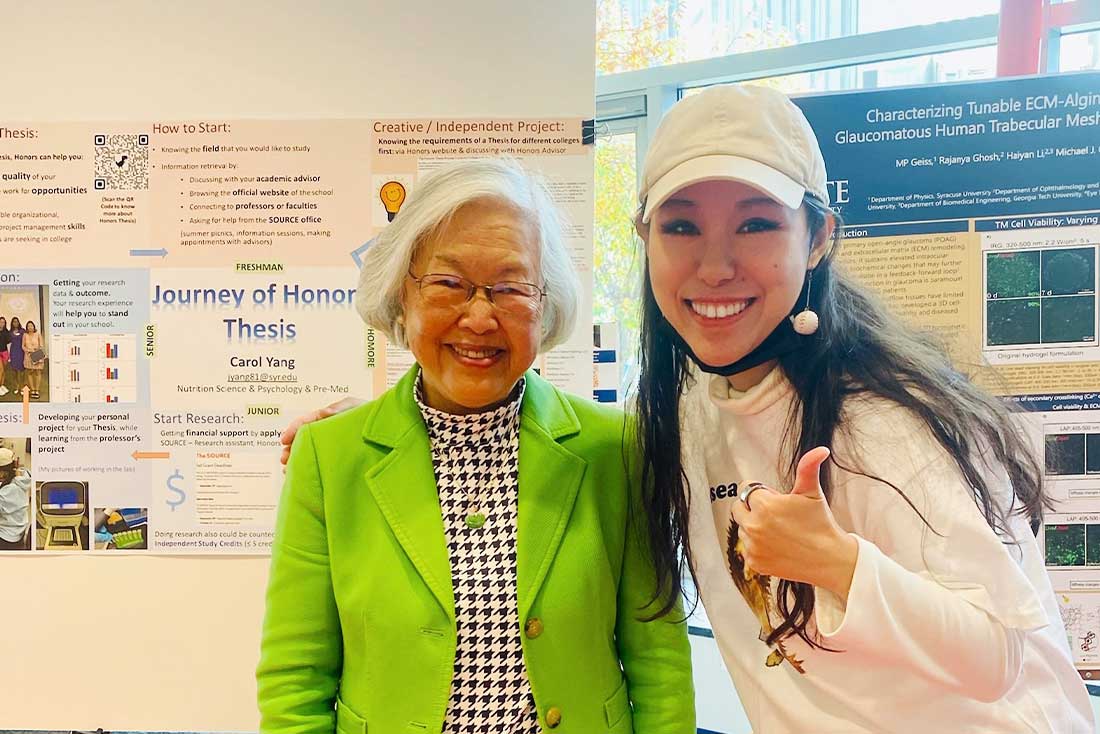
Junhui “Carol” Yang
A native of China, Yang is a member of the Renée Crown University Honors Program advisory board and the American Society for Nutrition, and this past fall she was nominated by Falk faculty as a candidate for a Syracuse University and Falk College Scholar Award. She received the Ruth Tolley Award from the Women of the University Community in Spring 2022, and she has received funding/scholarship awards from several Syracuse University programs, including SOURCE, the University Honors Program, International Student Success, and Invest in Success.
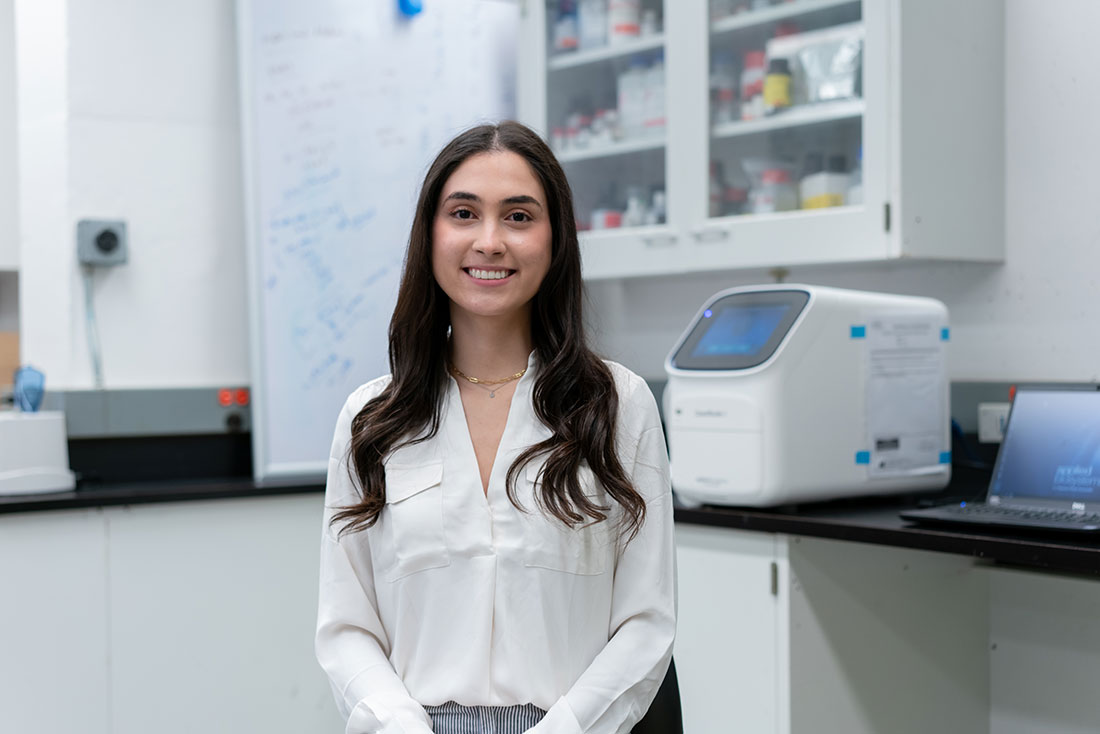
Mariana Pérez Lugo
A native of Puerto Rico, Pérez Lugo is president of the Catholic Student Association and an EMT for Syracuse University Ambulance and was an orientation leader. She is a Renée Crown University Honors Program student, and received the Nutrition Science and Dietetics Research Award-Undergraduate and the Emili Gere Coon nutrition student award. She has received scholarships/funding for her research as a McNair Scholar, WiSE Undergraduate Research Scholar, and SOURCE grant recipient. She is in Spain this semester with the Syracuse Abroad program.
Mariana Pérez Lugo says her research work in Falk College has provided valuable experience that will benefit her future career in medicine.
Joan Christy Lecture Series Presents Chef Educator Danny Corsun
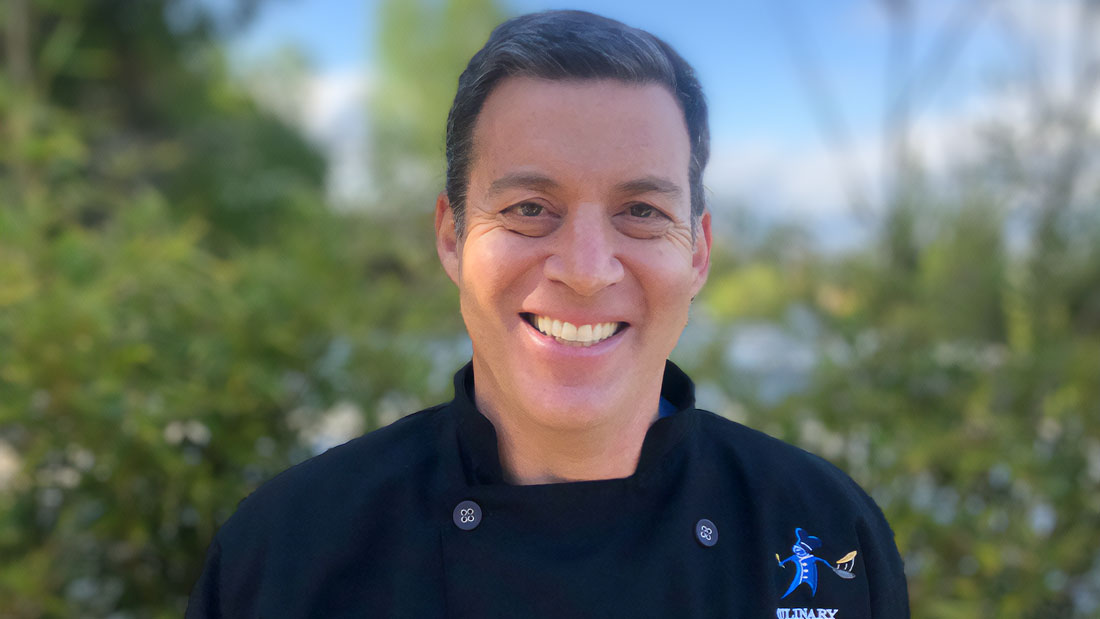
The Department of Nutrition and Food Studies will host chef educator Danny Corsun for “Edible empowerment: Using food as an experiential teaching vehicle” on Monday, March 6, from 3:30 to 5:00 p.m. in 335 White Hall, Falk College. View the event page for more details.
Danny Corsun has been a chef educator since 2000. As a classroom educator, he created a program that taught academic disciplines through experientially engaging cooking classes. This program created a fun classroom environment for students—and resulted in better cognitive processing and retention of curriculum. In 2005, he retired from that one classroom to teach in thousands.
Corsun created Culinary Kids Academy to provide math, science, history, and nutrition curriculum to youth across Los Angeles. In 2009 he expanded the company by adding a faith-based division. Culinary Judaics Academy uses both in-person programming and its “Masterclass for Jewish learning through cooking” digital platform to deliver dynamic, engaging, and experiential content and curriculum to Jews of all ages, affiliations, and levels of practice. Since 2005, Culinary Judaics Academy’s workshops have reached over 50,000 students worldwide.
The Joan Christy lecture series is made possible by The Christy Food and Culture Fund, established in 2005 through the generosity of Syracuse University nutrition alumna Joan Christy ’78, G’81 to provide support for a lecture series in the nutrition program at the University.
The event is free and open to the public. For accommodations requests, please contact Annette Hodgens at 315.443.9816 or ahodgens@syr.edu. For parking accommodations, please contact Mackenzie Kelly at 315-443-5573 or mkelly47@syr.edu.
Memories We’ll Always Treasure
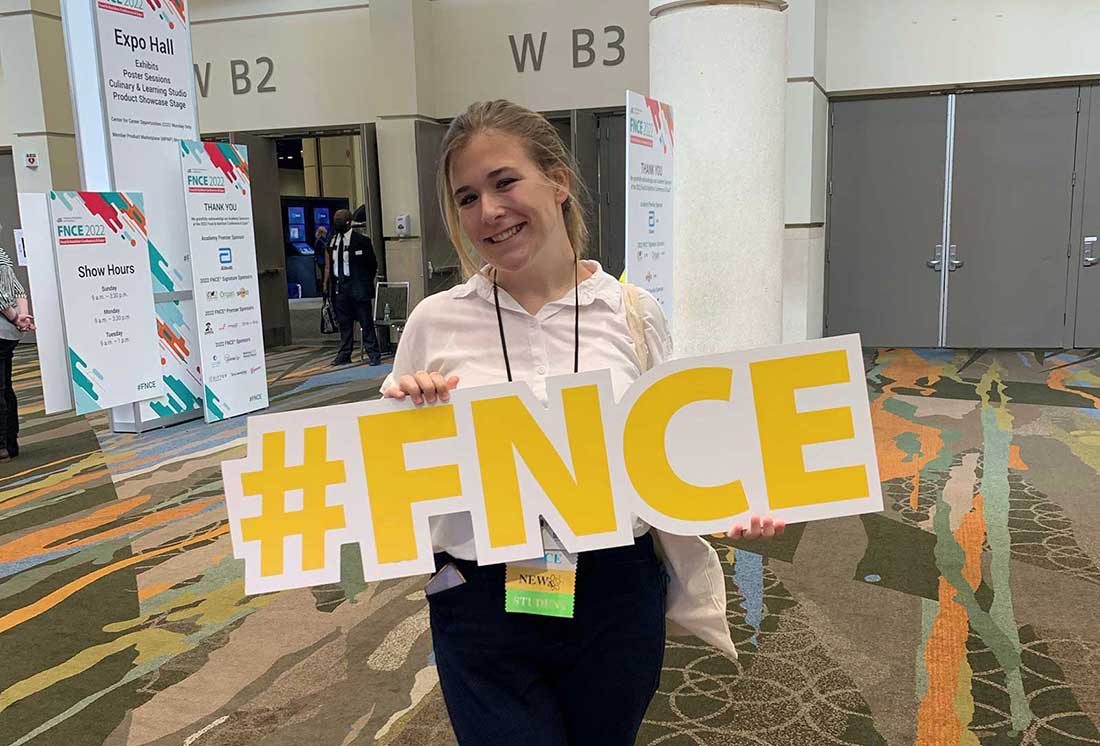
Each year, the Academy of Nutrition and Dietetics holds the Food & Nutrition Conference & Expo (FNCE). The Academy comprises the largest group of food and nutrition professionals in the world, and each year members from around the country travel to experience everything FNCE has to offer.
Unfortunately, the COVID-19 pandemic put a halt to FNCE. But after being held virtually for the past two years, the Academy and nutrition community was excited to welcome FNCE back in person this October in Orlando, Florida.
This year’s cohort of dietetic interns from Syracuse University were encouraged and supported by Falk College to attend FNCE. All 10 interns, along with multiple Falk nutrition faculty, traveled to Orlando for a weekend of networking, professional development, and fun!
FNCE 2022 did not disappoint and offered countless educational sessions, an impressive expo floor, and exciting networking opportunities. Each intern expressed immense gratitude for the opportunity to attend this inspiring event. As future dietitians, this was a valuable experience that inspired us as young professionals and reminded us of the important field we are working to enter.
When asked by our director to reflect on my experience, I noted that, “Connecting with other students and dietitians and hearing about their experiences and passions is inspiring and confirms that I am on the right track in becoming a dietitian.”
The conference was held from Oct. 8-11. After an exciting opening ceremony and hearing from Academy President and Syracuse University alumna Ellen Shanley, the conference began. There were sessions throughout each day, varying from topics such as sustainability to inflammation and malnutrition to cultural differences and accessibility.
There was truly no shortage of opportunities to learn. When the interns were not attending sessions or checking out research posters, we visited the expo floor. This year, more than 200 organizations attended FNCE. Brands and companies big and small showcased their products and services and to no one’s surprise, it was delicious!
Orlando showed its Orange spirit that weekend with representation from Falk College! Assistant Professor Jessica Garay presented research posters with student contributions titled “The Effect of a 3-month Lacto-ovo Vegetarian Diet Intervention on Diet Quality” and “The Effect of a 3-month Lacto-ovo Vegetarian Diet on Inflammation.”
Associate Professor and Undergraduate Director of Nutrition Kay Stearns Bruening presented a future practice poster titled “Focused interdisciplinary learning experiences improves awareness of interprofessional health profession skills.”
One of the most exciting events of the weekend was when the Syracuse University Dietetic Internship accepted the School Spirit Award. The interns and director Nikki Beckwith attended a reception with Academy President Shanley and heard words of professional advice from multiple academy board members. Nikki and interns were honored to accept the award from alumna Shanley and show their Orange pride!
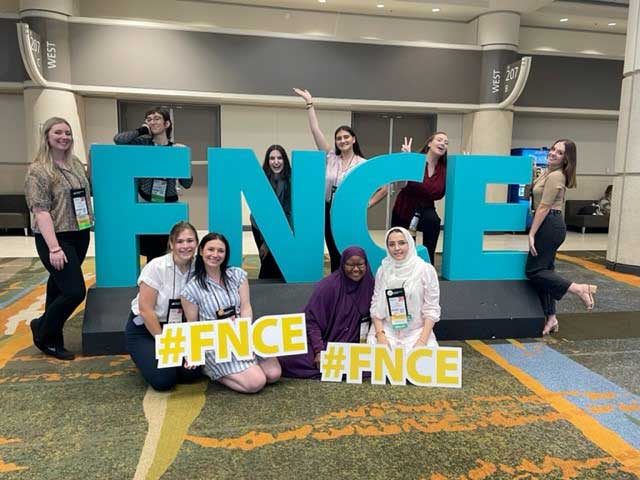
The Syracuse community was so proud that one of our interns, Rebecca Garofano, presented this year. Rebecca and her research partner, Helen Midney, presented on their research titled “Food Solidarity: Lessons from a Farmworker Community’s Food Pantry Garden.” (In April, Garofano was honored with the Outstanding Dietetics Student Award by the New York State Academy of Nutrition and Dietetics.)
All nutrition students hear about FNCE and the amazing opportunity it provides, however after experiencing it firsthand, the Syracuse University dietetic interns agree that this is an understatement. Having the opportunity to travel as a program was a memorable experience. We left with knowledge and insight on diverse topics, connections to professionals in the fields, and memories we will always treasure.
Editor’s Note: Baker was joined in Orlando by nine other dietetic interns who are graduate students and will complete their internships in May: Asma Bukhari, Dahabo Farah, Rebecca Garofano, Natalie Krisa, Olivia Mancabelli, Maureen Philzone, Jennifer Pope, Sydney Teeter and Shenna Tyer. If you’re interested in a career in nutrition and dietetics, learn about the programs offered through Falk College on the Department of Nutrition Science and Dietetics webpage.
—Maddy Baker ‘23, Dietetic Intern, Department of Nutrition and Food Studies
Diane Lyden Murphy Concluding Tenure as Dean
A longtime member of the Orange community, Diane Lyden Murphy ’67, G’76, G’78, G’83, dean of the David B. Falk College of Sport and Human Dynamics, has had an impactful, accomplished career at Syracuse University—as a student, faculty member and academic leader. Today, Murphy announced her plans to conclude her tenure as dean at the end of the academic year in 2023. A search for her successor will begin in January 2023.
“Diane has been a force of nature at Syracuse University since she arrived on campus nearly 60 years ago,” says Chancellor Kent Syverud. “She’s an innovator who inspires and engages others in transformational initiatives. Through her work in sexual and relationship violence, gender equality, diversity, inclusion and accessibility, Diane has both enhanced the student experience and helped our Orange community become a more welcoming place for students, staff and faculty.”
“In the years I’ve been at Syracuse University, I’ve been incredibly impressed with Diane’s work,” says Vice Chancellor, Provost and Chief Academic Officer Gretchen Ritter. “As a fierce advocate for her college and some of the University’s most important initiatives, she has an extraordinary ability to communicate with and engage others in what is truly important to the University experience. She is highly respected and for good reason because she is a person of high integrity.”
Murphy says serving her alma mater all these years, especially in her most recent role as Falk College dean, has been the honor of a lifetime.
“It has been an extraordinary privilege to be able to integrate my life’s work and focus as an activist scholar, social worker and social policy faculty with a career that articulates this effort in many ways over the years,” Murphy says. “I have built a cherished network of friends and colleagues that focus on matters of social justice and progressive peace work for both the community and the university, and together we have moved these communities forward.”
Appointed as dean of the College of Human Services and Health Professions in 2005, Murphy expanded that college with the Department of Sport Management to create the David B. Falk College of Sport and Human Dynamics in 2011. Murphy led a successful effort to integrate these disparate but complimentary curricula into one college, which moved into the White Hall-McNaughton Hall complex in 2015, physically bringing their departments together for the first time.
In addition to forging and shaping the Falk College, Murphy established a college Research Center and launched new undergraduate majors and minors, and several graduate programs. Her commitment to global education has resulted in study abroad opportunities throughout the Falk College. Her dedication to accessibility and global outreach led to groundbreaking new online programs, including online graduate programs in social work and marriage and family therapy. She helped create the food studies and sport management majors; launched the nation’s first bachelor’s degree in sport analytics; and integrated the Department of Exercise Science into the college. Murphy also led the creation of Falk’s Department of Public Health, and spearheaded collaborations with other colleges, including the School of Education, the College of Law and the Martin J. Whitman School of Management.
Mission-driven and passionate about issues of equality, diversity, inclusion and accessibility, Murphy believes that progress results from collective wisdom and collective action.
“We’ve learned a lot from the Haudenosaunee women, the Native women who have always led and been a very important voice, but their men lead with them,” says Murphy. “It’s about empowering people, getting people to the table, because collective voices make the best decisions. You need to have people who have different life experiences because they will think about things you wouldn’t have thought about.”
Murphy applied this passion to several critical leadership roles on campus. In August of 2021, she was one of a three-person interim leadership team appointed by Chancellor Syverud to advance the University’s diversity, equity, inclusion and accessibility (DEIA) priorities and strategic planning efforts. Murphy also serves as co-chair of the Chancellor’s Task Force on Sexual and Relationship Violence, a role she’s held since 2017. And, during former Chancellor Kenneth A. Shaw’s tenure, she served as a consultant to him on women’s issues while director of women’s studies. In that role she co-founded the University Senate Committee on Women’s Issues while also co-writing the University’s first Sexual Harassment Policy, Domestic Partnership Policies, Adoption Policies and Gender Equity Studies with the goal of elevating Syracuse’s commitment to a family friendly environment.
Murphy is a four-time Orange alumna. She earned a bachelor’s degree in sociology, a master of social work degree, a master’s degree in social science and a Ph.D. in interdisciplinary social science, all from Syracuse University. She became a member of the University’s social work faculty in 1978 and also served as director of the women’s studies program in the College of Arts and Sciences from 1989-2005, where it became a department with tenured faculty scholars and built the first B.A. and certificate in women’s studies at Syracuse University. She has also served as an elected faculty member of the Syracuse University Senate since 1980.
Committed to Student Success
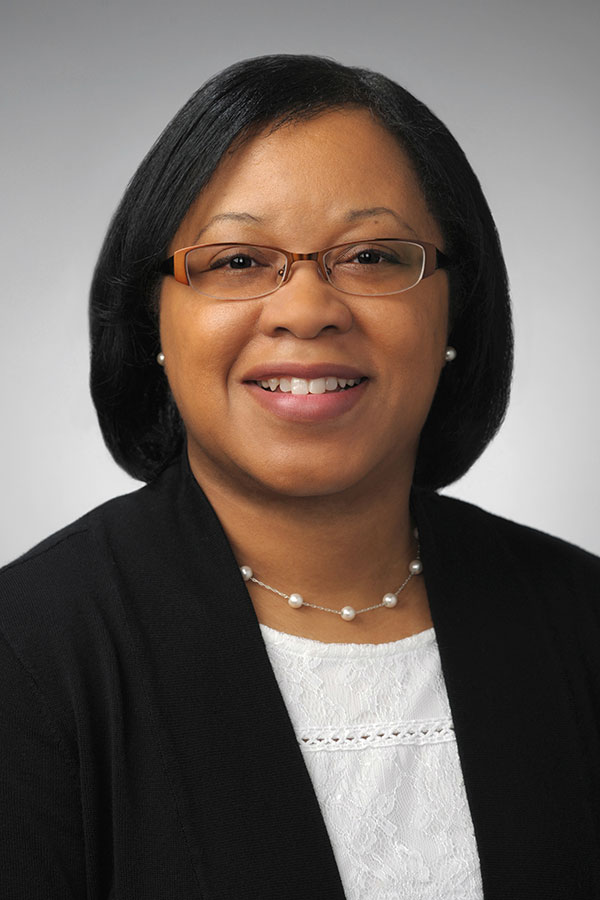
As a non-traditional, first-generation undergraduate student at Syracuse University, Chandice Haste-Jackson excelled academically but always felt there was something missing in her pursuit of knowledge.
That missing piece? Connecting with others.
“Ultimately, I discovered that in connecting with others, I could expand my knowledge and understanding beyond anything I learned from textbooks,” Haste-Jackson says. “That set me on a career journey oriented toward human connection, holistic development, and service, whether that be in fields of teaching, counseling, leadership, or administration.”
This past summer, Haste-Jackson’s lifelong journey of connecting with others continued with her appointment as Associate Dean of the Office of Student Services in Falk College. An associate teaching professor in Falk’s Department of Human Development and Family Science (HDFS), Haste-Jackson previously held several prominent HDFS positions and was chair of the Dean’s Committee on Diversity and Inclusion. In 2021-22, Haste-Jackson served as Syracuse University’s interim director of the First-Year Seminar course.
Before joining Syracuse University, Haste-Jackson was drawn to work that supported vulnerable populations. It was her job, she says, to help those populations expand their understanding, move from deficit toward sufficiency, and identify what wholeness, health, and stability meant to them and/or their families.
“Was this difficult work at times? Yes!” Haste-Jackson says. “But what I gained from these experiences is that our humanity connects us all, even those who are not like ourselves. We all want similar things–health, happiness, longevity, stability–and that makes us more interconnected than we think we are.”
To introduce Haste-Jackson to Falk students, we asked her to discuss her previous experience with students, the services offered by the Office of Student services, and questions that students might ask. Here’s that conversation:
What attracted you to your new job and why is it important that you’re helping Falk College students succeed?
After 20 years of working in nonprofit organizations and schools, rising through the ranks of direct service to executive leadership and administration, I spent a good deal of time teaching and training frontline employees and college student interns. In working with college student interns, I developed a desire to teach, mentor, and prepare the next generation of human service workers, a field that is very broad but one that involves human connection, holistic development, and service–tenets I live my life by!
Given the climate in which we live in today, college students are dealing with issues that may impact their ability to successfully engage in academic pursuits. The COVID-19 pandemic, mass racial violence, wars, and significant personal losses have impacted academic performance and emotional well-being. Helping students to navigate these challenges during their time with us in Falk College is what I endeavor to do, and I am committed to leading and supporting the professional staff in our office who have made that same commitment to student success.
I’m a first-year or transfer student who isn’t familiar with the Office of Student Services. What are the services you provide?
In your first year at Syracuse University, our office will provide academic counseling and advising around other areas in your life that you identify as being important to your growth as a student in Falk College. Additionally, our office supports career exploration and professional skill development, and offers opportunities for learning through career immersion experiences.
Every first-year and transfer student has an assigned academic counselor, and the Office of Student Services will be one of the first places that you connect with to learn more about your major and all the resources available at Syracuse University.
I’m a student struggling with my classes and I’m not sure if I’ve chosen the right major. How can you help?
This is common for students who are adjusting to the intensity of college-level work. We can help you identify the source/cause of the struggle with your classes and then locate campus resources that you might consider accessing for help.
Sometimes, making a change in how you study, how much time you give to studying, or even where you study is all that may be needed to alleviate the struggle. Sometimes, motivation is at the root of the struggle and subsequently causes you to consider if the major is right or not. We’ll help you to explore and develop a pathway to successful academic performance.
I’m a student having a hard time being away from home and I’ve got personal issues that are getting in the way of my sleep, classwork, and social life. Do I go to you or somewhere else?
You most certainly can meet with your academic counselor to discuss these personal issues. Our academic counselors will listen and help you find the resources that are right for you and meet your needs. You do not have to be alone in trying to address emotional, social, or academic well-being.
We also recommend that students contact the Barnes Center at The Arch and/or Hendricks Chapel for support with any personal issues that arise. We are well-connected to these two resources and support student engagement with their services.
Why is it important for students to see you if they have issues rather than trying to work them out on their own? Isn’t that what college is for, learning how to handle stress?
Absolutely! Learning how to handle stress is an expectation of a college student, yet many students are not prepared for the inherent stress that comes with transitioning to college. During the first year of study or even subsequent years, there are a series of social, emotional, and academic adjustments that must occur for you to be successful as a college student. There will be some new stressors, and some of your past ways of handling stress may not be as effective for you now.
Being proactive in seeking help before something becomes an issue is also something that college students are expected to learn early in their college career. We can help you to learn these skills and support you along the way as you employ them.
Help is Here
The Falk College Office of Student Services is in Suite 330 Barclay Hall. You can visit at any time or schedule an appointment by calling 315.443.3144 or emailing falkss@syr.edu. Visit the Office of Student Services webpage for more information and a complete list of services, important announcements, and staff directory.
Lessons from the Farm Stand
About an hour north of the Syracuse University campus is a farm stand bursting with vibrant, colorful vegetables, where goats and chickens roam free and customers try their best downward dog at yoga classes in a hops field.
This is Forty Roots Farm Stand, a farm stand owned and operated by Chaya Lee Charles ’04, G’14, assistant professor of nutrition in the Department of Nutrition and Food Studies. Charles opened the farm stand in 2020 with her husband, Martin, a high school culinary arts teacher, and a friend who has a background in agricultural science.
“Getting students out of the classroom and sharing my experience at Forty Roots is crucial to getting them excited about working in the field and thinking about how they want to use their degree in the future,” says professor Charles.
The farm is a welcome counterbalance to the hustle and bustle of academic life, and it provides Charles with real-world lessons she shares with her students in the classroom. “My work on the farm has given me hands-on experience that I can share with my students. When I’m talking about food science, the nutritional quality of food, how soil health impacts that and all those things in my courses, I now have tangible experience of how that works,” Charles says.
The agricultural setting is not only perfect for growing organic vegetables, but for bringing some important lessons to her students and her community work.
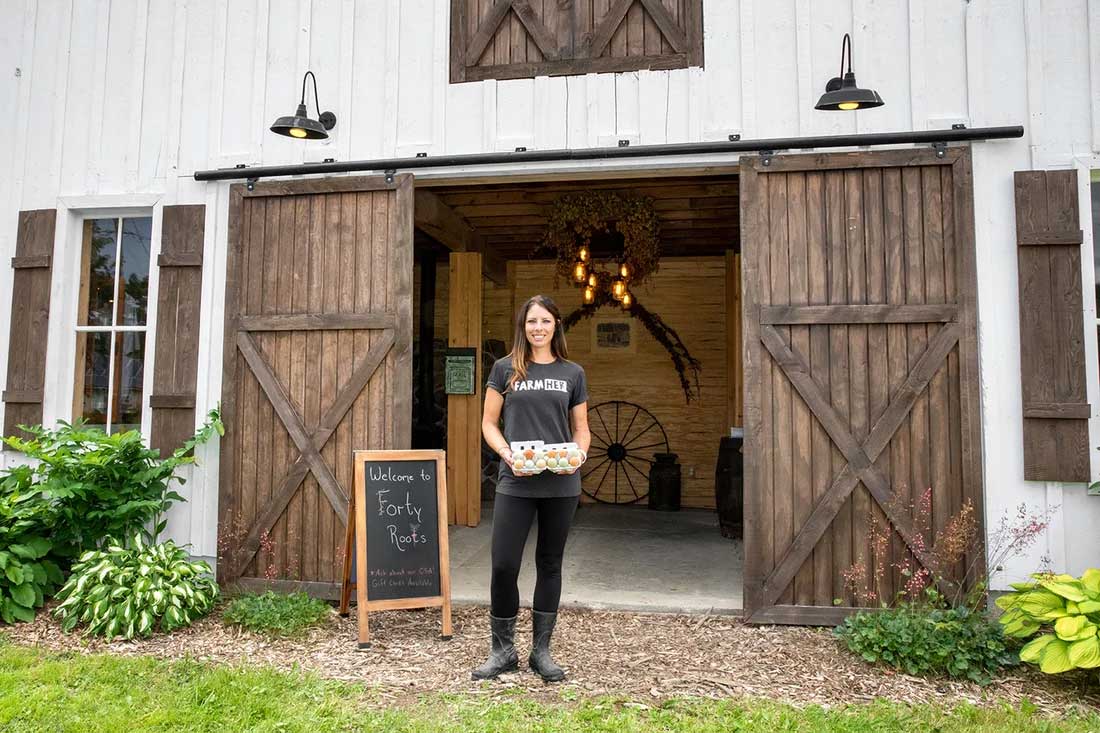
Digging in the Dirt
Charles teaches nutrition education in Falk College, including courses on food science, nutrition education, weight management and disordered eating. “One of my goals as a teacher is to always bring real-life scenarios into the classroom so students can learn via hands-on experience,” Charles says.
Among the work she does in the community is with Parkinson’s disease management, an area she became interested in from working with older adults as a practicing dietitian in long-term care and assisted living facilities. She works with Empower Parkinson, an organization in Syracuse that helps people with the disease to maintain their functional abilities. “At Empower Parkinson, we provide alternative and combination therapies to help people manage their Parkinson’s disease symptoms,” Charles explains.
A group of students work with Charles and Empower Parkinson through a gardening program called Planting for Parkinson’s, a community garden that grows food that’s been linked to potential benefits for people living with Parkinson’s disease.
“At Empower Parkinson, we provide alternative and combination therapies to help people manage their Parkinson’s disease symptoms,” says Charles.”
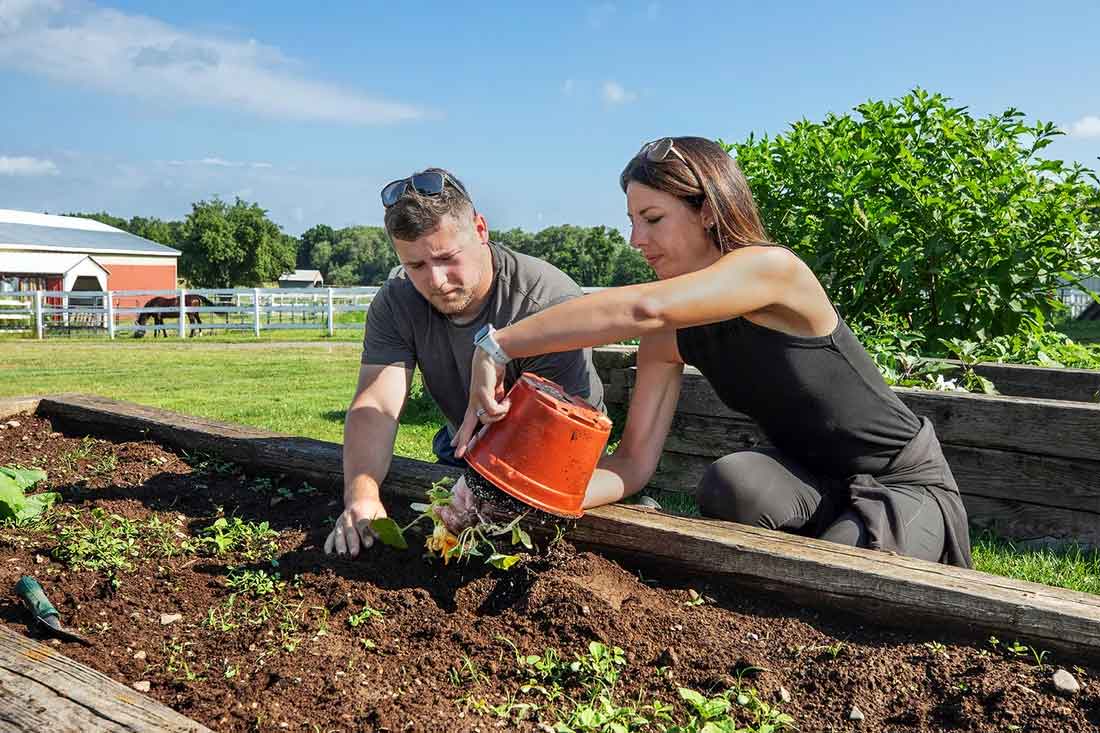
Nutrition major Philip Farina ’23 has been working with Charles this summer in the garden. Though he began doing the work as part of a class project, he volunteered to continue with the program after the course ended and says the experience is personal as his grandmother had Parkinson’s disease.
“I’ve enjoyed working with Professor Charles this summer,” Farina says. “I’m learning about nutrition program planning, volunteer coordination, and I’ll be conducting education sessions too.” Farina plans on becoming a registered dietitian and says the planning and community education experience he’s gotten this summer are important skills he’ll be able to apply to that career.
Charles has multiple avenues for students to explore their food passions. She has led a student group in working with the Syracuse City School District, assisting their dietitian to create a fruits and vegetables campaign for the elementary schools in the district. “My main goal for students taking my classes is to leave with increased interest and curiosity on the topics we discuss, as well as an improved sense of how to apply acquired knowledge in settings within the field,” says Charles, now the advisor for the student group Slow Food, which focuses on supporting local food and traditional cooking.
Another group of students has worked with the Sustainability Management office to develop pamphlets on how to utilize the Hendricks Chapel Food Pantry and created easy-to-follow recipes using fruits and vegetables from the University’s community garden. “Those are things that could be available at the campus food pantry to help students,” Charles explains.
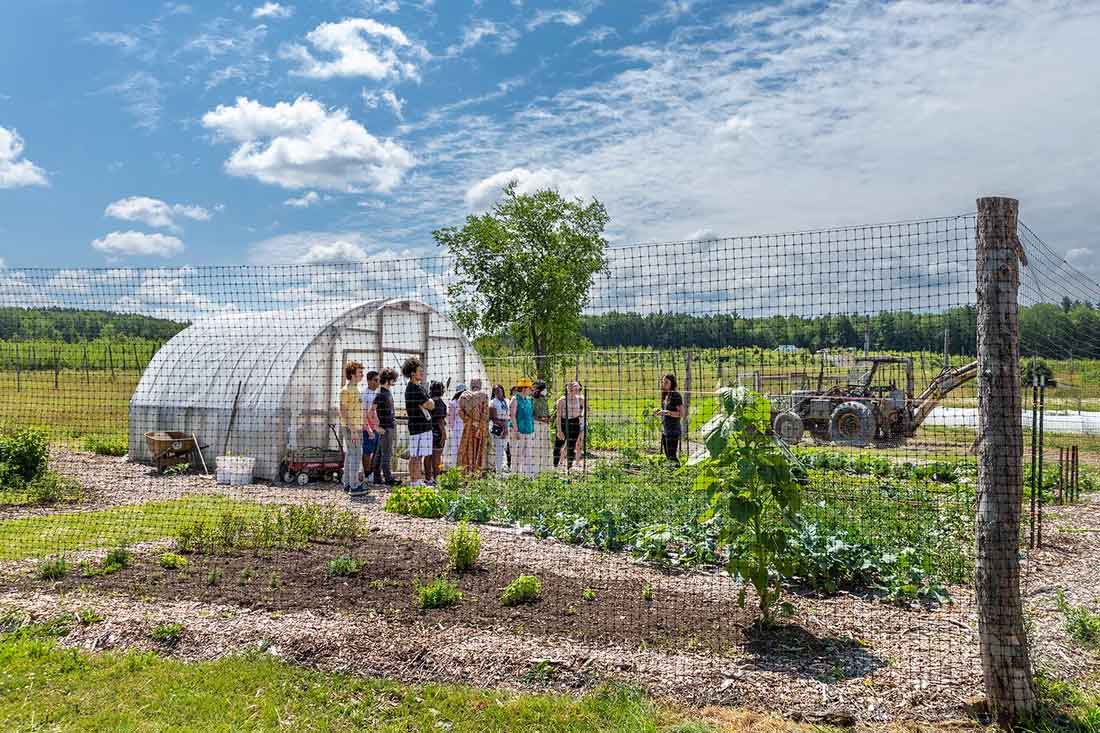
Nutrition for the Next Generation
Charles is also involved with another community garden on campus, Pete’s Giving Garden, which harvests produce for the food pantry. Her involvement is fueled by her passion for gardening and nutrition in general. “Nutrition is so crucial for good health—more so than people understand.”
Her passion for the field and her interest in preventative nutrition was strengthened after the birth of her son, now 9 years old. Consuming fresh, whole, unprocessed, organic foods is especially important, says Charles, to avoid disease later in life.
“As a dietitian, I try to bring the nutrition component into what we’re growing and chose foods to grow that have the best nutritional profile for our customers, and then I provide them with nutrition information on the items and healthy recipes of how to use them,” says Charles.
Charles offers community-supported agriculture (CSA) through Forty Roots and the trio is working on opening a café at the farm stand, revitalizing the hops and will soon build a greenhouse for winter gardening. The property used to be a horse farm and then a hops farm before Charles and her business partners bought it. “There’s so much time and effort that goes into organic growing, so when you get a great end product it’s pretty satisfying,” Charles says. She also brings her nutrition expertise to the CSA boxes they provide. With each weekly box customers receive, Charles includes recipes, healthy tips and instructions on how to use the vegetables.
Though one of the greatest rewards, says Charles, is when her students come back and tell her that they’ve applied the knowledge they gained through her classes and experiences in their post-grad work. “Getting students out of the classroom and sharing my experience at Forty Roots is crucial to getting them excited about working in the field and thinking about how they want to use their degree in the future.”
A Syracuse University Story by Lisa Maresca originally published on September 6, 2022.
Dean Murphy Welcomes Falk Students
Dear Falk Students,
Finally, our beautiful campus is packed with energy after the quiet summer months. It’s great to see our returning Falk students—we’re so glad to have you back! Please join me in giving a big Orange WELCOME to the Class of 2026, and to our new transfer and graduate students! Our Falk family just got a whole lot bigger.
As we share in the excitement of a new semester, I want to remind you of some important information that will help you navigate life on campus.
Official Syracuse University Communications
Syracuse University email is the primary communication method at the University. Your professors and University offices will contact you with important information using your Syracuse University email address (ending in “@syr.edu”), not your personal email address. It’s important to read your University email at least once every day so you’re aware of the latest information that’s essential to you.
Public Health Information
Public health remains a critical priority for life on campus. Please review the Fall 2022 Public Health Guidelines. We fully expect all Falk College students to follow University public health guidelines. For public health information and updates, please visit the Stay Safe website, the official source of public health information for Syracuse University. Thank you for doing your part to keep our community safe and healthy.
Student Support Services
Falk College Student Services is an important resource in your support system at Syracuse University. Student Services counselors are here to provide you with academic advising and help you meet your requirements and goals. In addition, they are your resource for private consultation related to student social and emotional concerns. If you have any concerns throughout your academic career, please contact Student Services or visit Suite 330 Barclay Hall in the Falk Complex.
I encourage you to connect with the staff at Falk Career Services, who can help you prepare for life after college through career exploration, internship and job searching, professional networking, and more. They are also located in Suite 330 Barclay Hall, or you can search for opportunities through Handshake, the University’s job search and professional events portal.
In addition, you can connect to spiritual life on campus at Hendricks Chapel, as well as health and counseling services in the Barnes Center at the Arch.
Student Spaces in Falk College
The Student Lounge, located in Falk 216, is available to you anytime the Falk Complex is open. The lounge has a microwave, refrigerator, and vending machines for student use. Across the hall is the Falk Café on 2, open 8:00 a.m. to 3:00 p.m. Monday through Thursday and 8:00 a.m. to 2:00 p.m. Friday starting September 6. Visit the Food Services website for up-to-date operating hours for cafés and dining centers across campus. Just down the hall is Falk 229, the quiet student lounge.
There are several computer labs in the Falk Complex. Falk 113 is a PC lab, and Falk 229 is a quiet study area that has both PCs and Macs available for your use. Both spaces are available to students at any time. Falk 400 and 407 are PC labs that are also used as teaching classrooms. When class is not in session, they are open for student use. You may check their schedule of availability using the 25Live website. You may also use the quick-print stations in Falk 216 and 229 for printing and email. These stations log out automatically after 15 minutes of use.
Ways to Get Involved
The Student Involvement Fair will be held Thursday, September 8, on the Quad from 4:00 to 7:00 p.m. There are more than 300 student organizations at Syracuse University. Be sure to explore organizations that might be outside your usual interests, too. Remember, this is a great way to meet new people and discover something new about yourself!
There are many exciting events planned for Fall 2022, including two signature Syracuse University events: Family Weekend October 14-16 and Orange Central, Syracuse University’s annual homecoming and reunion weekend, September 29-October 2. You can discover activities and events on campus by visiting the Syracuse University Calendar.
There are so many ways to connect, express, and grow at Syracuse University, and these are just a few suggestions to get you started. I encourage you to visit the Syracuse University For Students page for more resources and opportunities to make the most of your Syracuse experience.
I wish you the best as you begin (or continue) your Orange story. Best of luck to each of you. We’re excited to see all that you will accomplish this year.
Go Orange!
Diane Lyden Murphy, M.A., M.S.W., Ph.D.
Dean
Falk College
Welcome Class of 2026
Welcome to Syracuse, new Falk College students! The newest Falk students in the Class of 2026 are a talented group from 30 states and 18 global countries. We welcome 386 first-year and 14 transfer students who join new graduate students, 141 in residential programs and 244 online. We’re glad you’re part of the Falk family. Altogether, the Falk College student body is 2,140 strong!
We look forward to meeting with you, your families, and friends at Syracuse Welcome August 25-28, 2022. It will be an exciting time of meeting new classmates and professors, and discovering all that our campus and region have to offer.
Join us for important Falk College welcome events. You can also check out the main Syracuse Welcome website for information on all events surrounding Syracuse Welcome and getting moved in!
Falk College Syracuse Welcome Events:
Promoting Social Equity Through Food
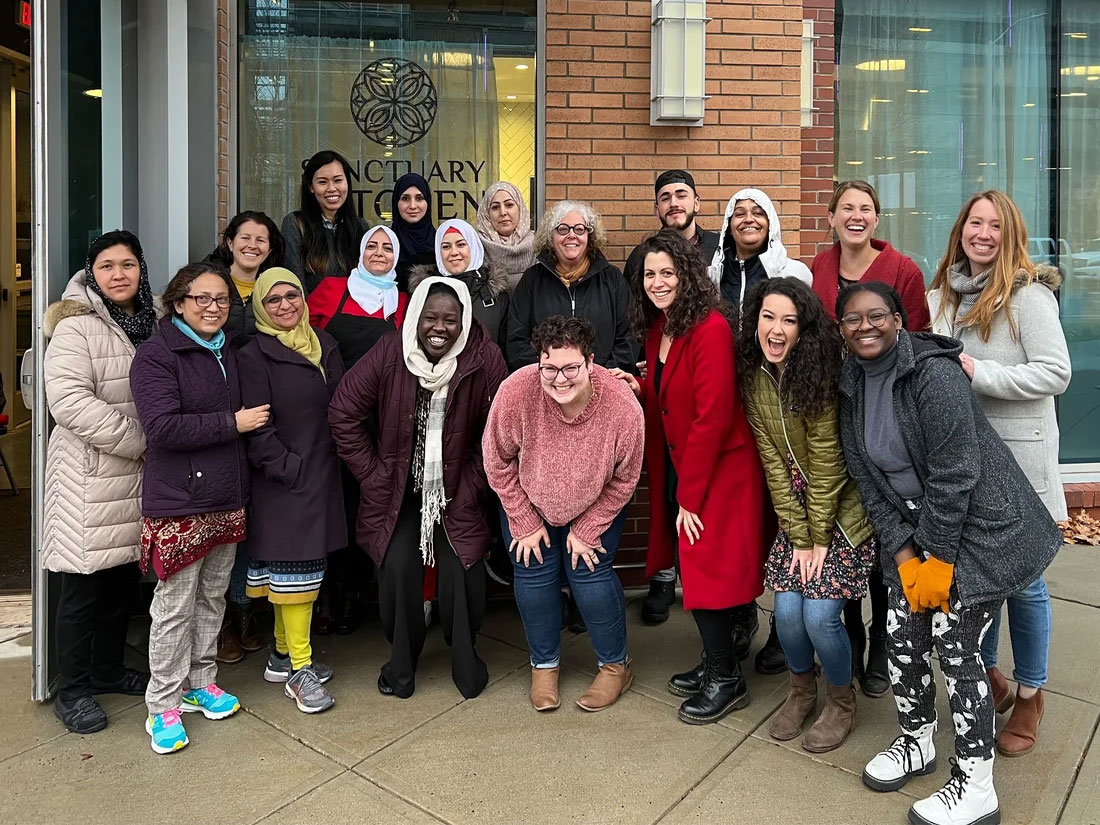
Their guiding principle, Santino explains, was that every aspect of the program be true to the goal of promoting social equity. This meant ensuring that those served by the program played a central role in shaping it, that every contributor was compensated, and that the curriculum centered the perspectives of food industry leaders from marginalized communities. The program highlighted the interconnectedness of social justice issues. “We formulated the curriculum around the injustices that overlap in the food and the prison systems, focusing on how to bring more options for healthy, culturally appropriate and affordable food into communities disproportionately affected by inequity,” they explain.
The project speaks to the essence of what drew Santino to the food studies graduate program: They sought an education that would help them work effectively at the intersection of food and social justice. And now, with a career that evolved directly from their master’s thesis, Santino leverages the insight and passion gained through years of working in the field into agency for change.
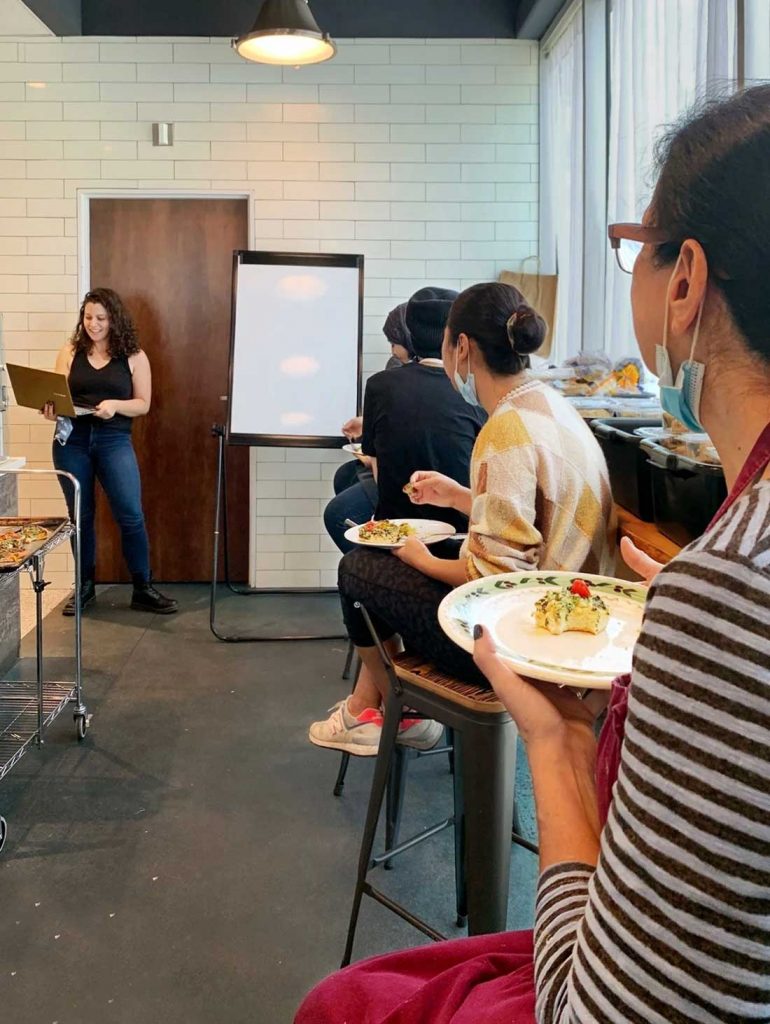
Empathy From Experience
The formative experience that set Santino on their path was the food insecurity they experienced as a youth. When Santino, who grew up just outside New Haven, Connecticut, was 11, their parents’ divorce precipitated abrupt changes that pushed Santino and their siblings and mother into poverty. And while Santino’s family gave up their car and lost their house to foreclosure, the change Santino felt most keenly was lack of food. “I grew up in an Italian American culture, and food was a central part of community. In my younger years it was always around and there was a lot of it. And then as I got older, there was significantly less.” For many years, school lunches provided their most stable and nutritious meal of the day.
Santino characterizes their middle and high school years as challenging, in part because they contended with then-undiagnosed ADHD, but they began to develop a sense of direction during their first year of community college. They took some culinary and hospitality courses and started working in restaurants. Affirmed in their interest, Santino transferred to Johnson and Wales University and earned a bachelor’s degree in culinary arts and food service management.
The education Santino received through working in the culinary and hospitality field—in a range of roles throughout college and beyond—was equally formative. While they appreciated the independence gained through work, they were increasingly troubled by aspects of the industry that conflicted with their values. Particularly disturbing, they say, was the dehumanizing work environment of some corporate establishments and the stark socioeconomic disparities between some restaurant workers and clientele.
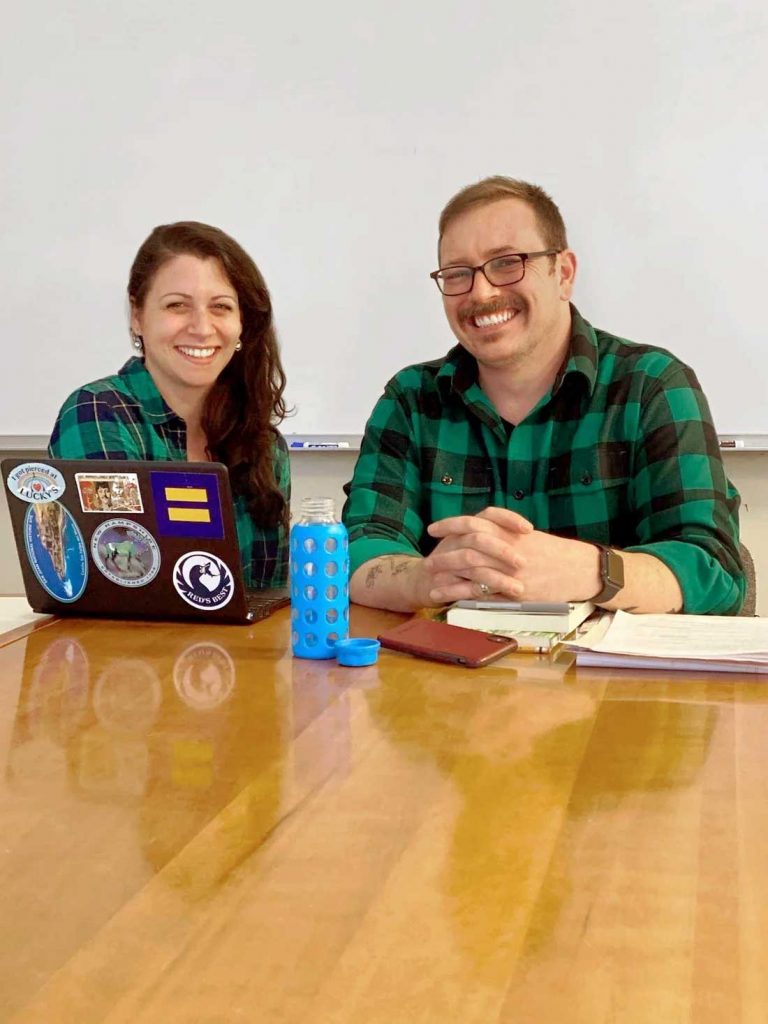
The Perfect Mix
Santino sought opportunities to work with organizations that addressed issues at the intersection of food and social justice. Their first such position was at a women’s shelter where both the food and the culture aimed to promote health, community and a sense of dignity for all involved. They also worked at a nonprofit that provided a bakery training program for formerly incarcerated people. The emphasis on culinary arts as a means to financial security resonated with Santino, and the role provided an eye-opening education into the incarceration system. “Having candid conversations with the returning citizens and hearing their stories helped me understand how people who have contact with the prison system get completely disregarded by society,” Santino says.
Santino discovered the food studies program at Syracuse University by chance, after accompanying a friend to a career fair. They found the program deeply compelling, characterizing it as a “perfect mix of food and social science—with a little bit of public health thrown in.” Although at that point Santino had written off the possibility of graduate school, assuming it would be financially beyond reach, they applied.
During an exploratory visit to campus, Santino met food studies and nutrition professor Evan Weissman, and the positive experience confirmed their decision to enroll. “I visited in April, and it was typical Syracuse weather—65 degrees one day and snowing the next,” Santino remembers. “I was thinking, ‘I don’t know about this,’ but when Professor Weissman showed me the food study suite and I saw the different things happening there, I knew that this was exactly where I wanted to be and what I wanted to do.”
Weissman became a mentor whose own work Santino could build on, and he served as their advisor until he died unexpectedly in 2020. “I wanted to create participatory programs, centered around food, with people who are most affected by issues of income and racial inequality. The food studies program and Professor Weissman helped me put my ideas on paper and start to imagine how to execute them.”
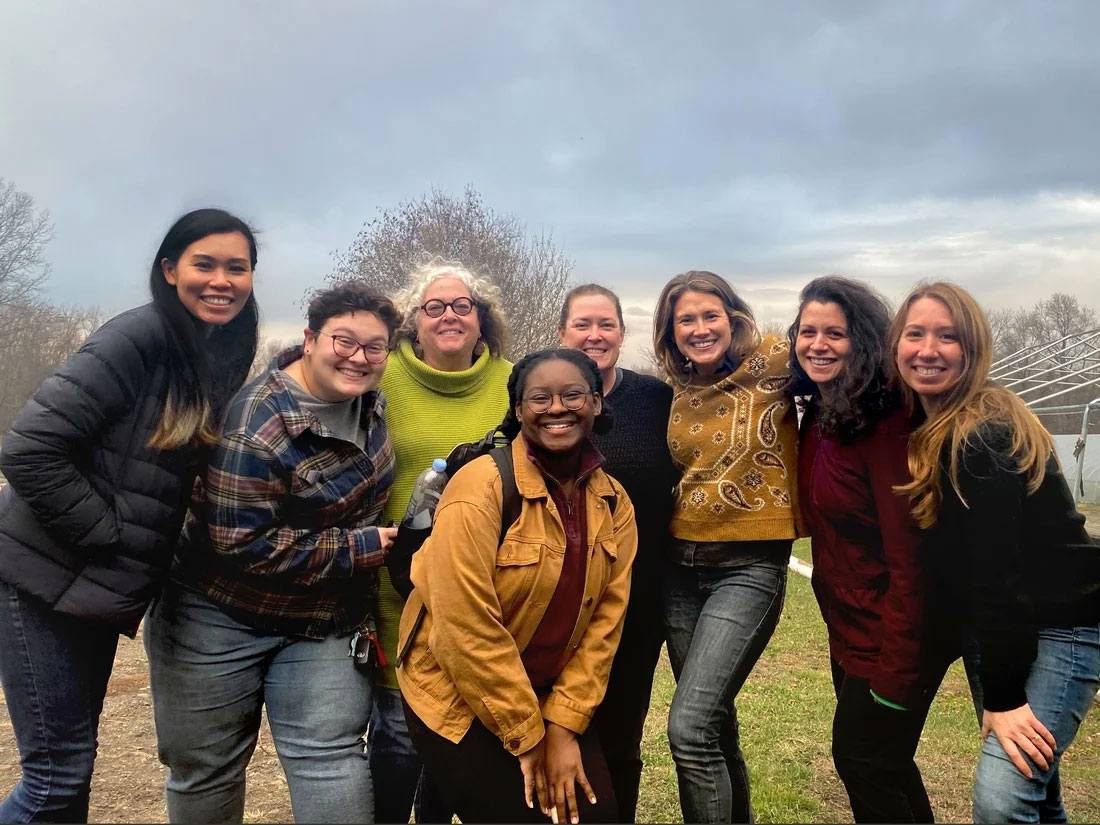
From Capstone to Career
Among the many agencies Santino worked with to develop the educational program that served as their master’s thesis was City Seed—a nonprofit in New Haven focusing on sustainable agriculture, community and economic development. That connection led to accepting a position as manager of City Seed’s emergent food entrepreneurship program and working with early-stage entrepreneurs—many of whom are women, recent immigrants and people of color—to help them launch their food businesses.
It’s a role Santino is imminently equipped to handle. “All my life I’ve had to hustle and put out fires. Then I had the chance to study the interconnectedness of social issues in the food program. Now I’m drawing on both those experiences to support people in launching their food businesses—it’s a perfect culmination.”
A Syracuse University Story by Sarah H. Griffin originally published on June 14, 2022
Congratulations Class of 2022
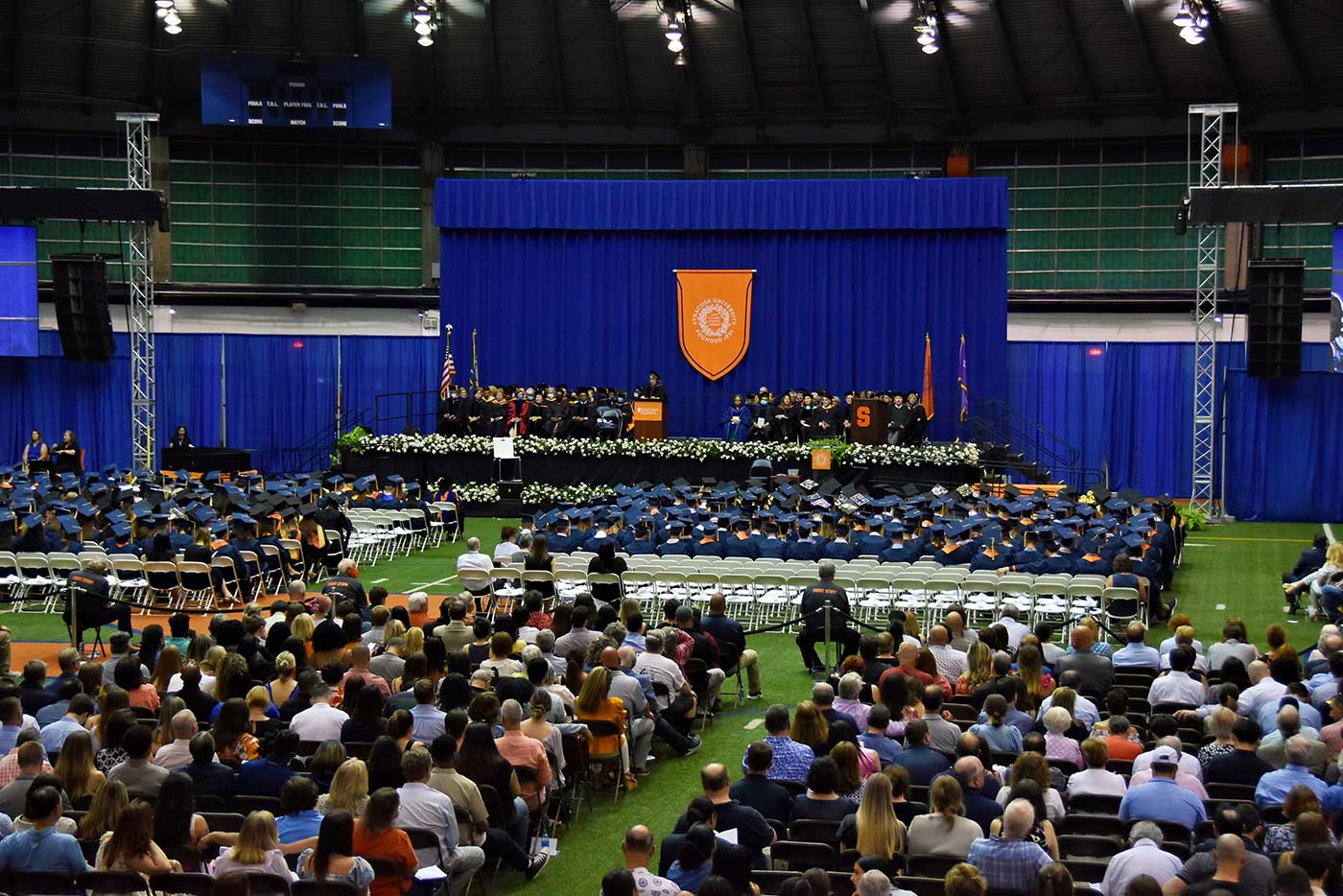
325 undergraduates;
131 masters candidates;
24 students earning certificates of advanced study, and;
4 Ph.D. students.
Through the month of May, departments across Falk College honored student achievements and celebrated the graduating Class of 2022, which are detailed on individual department websites.
Falk College Convocation was held Saturday, May 14 at Manley Field House. Falk College Convocation, other college convocations, and the May 15 Syracuse University Commencement ceremony, were recorded and are available to view on the Syracuse University commencement website and is also included below.
Falk College Convocation | Saturday, May 14 | 4:30 p.m. ET
Falk College Convocation Photos
Page 3 of 18
